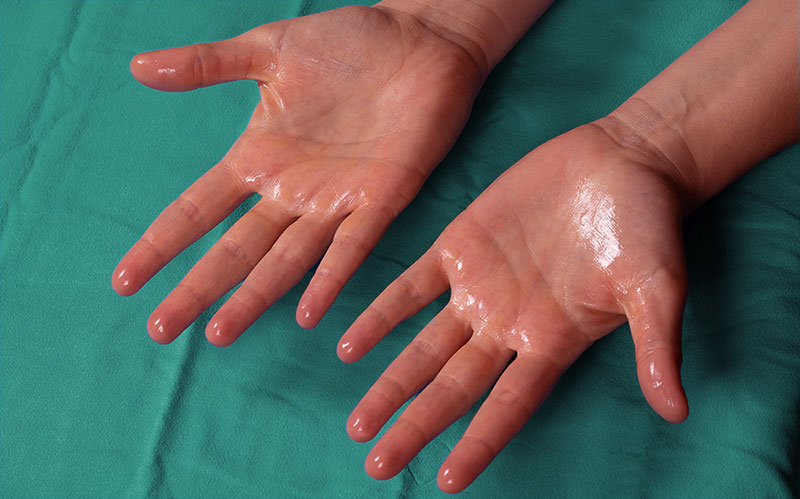Comprehending Excessive Sweating: Dermatology Insights on How to Stop Sweaty Hands
Comprehending Excessive Sweating: Dermatology Insights on How to Stop Sweaty Hands
Blog Article
Understanding the Source of Excessive Sweating and Its Effect On Every Day Life
While it is commonly understood as a physiological response to manage body temperature level, the triggers for extreme sweating can differ extensively among individuals, including not only physical factors but mental and also psychological components. By delving right into the root causes of hyperhidrosis and exploring its diverse results, a deeper understanding of this pervasive issue can be gained, shedding light on the complexities that individuals grappling with extreme sweating navigate on a daily basis.
Physiology of Sweat Glands
The policy of sweat production, a vital physical process, is mainly controlled by the activity of sweat glands dispersed throughout the human body. Sweat glands are classified right into 2 major types: eccrine and apocrine glands.
When the body temperature rises, either as a result of physical task, high temperatures, or emotional tension, the nervous system sets off the gland to produce sweat. This sweat is composed mainly of water and electrolytes like salt and chloride. The procedure of sweat manufacturing is essential for maintaining the body's inner temperature within a slim, optimal variety, highlighting the essential duty sweat glands play in human physiology.
Triggers for Excessive Sweating
In recognizing the origin of excessive sweating, it is crucial to identify the triggers that can bring about this physiological response. Too much sweating, likewise referred to as hyperhidrosis, can be motivated by various elements, both ecological and physical. One usual trigger is emotional anxiety or anxiousness, which can stimulate the body's sweat glands to produce even more sweat than is necessary for cooling down. Physical effort, high temperature levels, and spicy foods are likewise known to cause excessive sweating in people prone to this condition. Certain medical problems like menopause, diabetes, or hyperthyroidism can add to too much sweating as well.
Moreover, drugs such as some antidepressants, opioids, and particular supplements can likewise function as triggers for hyperhidrosis. Comprehending these triggers is essential in handling too much sweating efficiently - Exessive Sweating. By identifying and attending to the specific triggers that prompt too much sweating in a private, healthcare suppliers can establish customized treatment plans to reduce this condition and boost the person's lifestyle
Medical Issue Associated
Related to too much sweating are various medical problems that can intensify this physical action. One typical problem is hyperhidrosis, a disorder characterized by extraordinarily enhanced sweating that surpasses the body's thermoregulatory requirements. This can show up in focal areas like the palms, soles, underarms, or face, influencing an individual's lifestyle due to social humiliation and pain.
Additionally, endocrine problems such as hyperthyroidism, diabetic issues, and menopausal warm flashes can likewise lead to extreme sweating. Hyperthyroidism triggers an overflow of thyroid hormonal agents, speeding up metabolism and setting off sweating.
Furthermore, infections like hiv, endocarditis, and consumption have been related to night sweats, a typical sign known to disrupt sleep and impact total health. These clinical problems highlight the diverse series of underlying aspects that can add to extreme sweating, demanding extensive examination and monitoring by healthcare experts.
Mental and psychological Aspects

Influence On Social Communications
Extreme sweating can have extensive impacts on a person's capacity to engage conveniently in social communications. The visible indicators of sweat discolorations or wet patches on clothes can lead to shame and self-consciousness, causing people to withdraw from social situations. This withdrawal can impact connections, restriction social activities, and prevent professional and individual growth.

Additionally, the anxiousness and self-worth concerns stemming from too much sweating can influence interaction and social abilities. People may battle to focus on conversations, take part in group activities, or share themselves confidently. This can result in feelings of seclusion and solitude, as social links end up being challenging to maintain.
Conclusion

While it is typically understood as a physical action to regulate body temperature, the triggers for too much sweating can differ widely amongst people, including not just physical variables yet likewise psychological and psychological aspects. By diving right into the origin creates of hyperhidrosis and discovering its diverse results, a deeper understanding of this pervasive concern can be gained, shedding light on the intricacies that individuals grappling with too much sweating browse on an everyday basis.
Physical exertion, high temperatures, and spicy foods are additionally known to set off excessive sweating in people susceptible to this condition. By recognizing and attending to the particular triggers that motivate too much sweating in a specific, medical care companies can create individualized therapy strategies to reduce this condition and enhance the individual's quality of life.
Extreme sweating can have extensive effects on a Sweaty hands treatment person's ability to involve easily in social communications.
Report this page